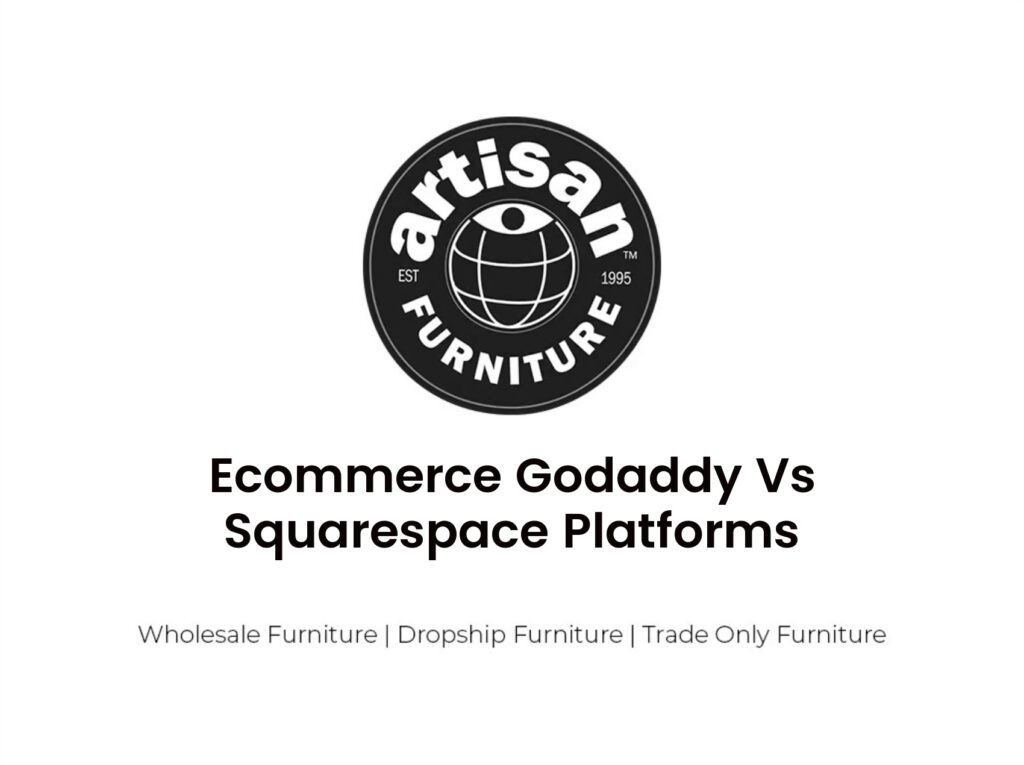Ecommerce Godaddy Vs Squarespace Platforms
In the vast landscape of ecommerce platforms, GoDaddy and Squarespace emerge as two prominent contenders. Choosing the right platform is paramount to the success of your online business.
This article aims to provide a comprehensive comparison of these platforms, exploring aspects such as ease of use, design flexibility, features, and ecommerce capabilities.
By delving into the specific functionalities and benefits offered by each platform, we aim to assist you in making an informed decision that aligns with your business goals and aspirations.
Table of Contents
ToggleEase of Use Comparison
One of the key factors to consider when comparing the ease of use between GoDaddy and Squarespace is the overall user experience. Both ecommerce platforms aim to provide a user-friendly interface, but there are some differences in terms of ease of use.
Squarespace takes the lead in this aspect, scoring 4.4 out of 5 in ease of use testing. Its editor is intuitive and offers professionally-designed templates, making it easier for users to create visually appealing websites. Over 90% of users would recommend Squarespace for its ease of use.
On the other hand, GoDaddy scores 4.1 out of 5 for ease of use, making it suitable for quick website setup. However, some users find GoDaddy’s simplicity frustrating and struggle with its features and terminology. While it may be easier to get started with GoDaddy, Squarespace offers a more comprehensive and user-friendly experience in the long run.
For those looking to start an ecommerce business or engage in dropshipping, Squarespace’s ease of use and design flexibility make it the preferred choice. Its high-quality templates and powerful features cater well to the demands of online selling. GoDaddy, while providing similar ecommerce features, lacks the advanced options and offline selling capabilities that Squarespace offers.
Design Flexibility Evaluation
Squarespace’s design flexibility is rated 4.7 out of 5, making it the top choice for visually appealing and trendy websites. When it comes to creating a stunning online presence for your home furniture or home decor business, Squarespace offers high-quality and modern templates that will surely catch the attention of your target audience.
With its aesthetic and modern designs, Squarespace surpasses other builders in terms of website building. The templates provided by Squarespace are not only visually appealing but also highly customizable, allowing you to create a unique and personalized website that reflects your brand identity.
Whether you are looking for a minimalist and clean design or a bold and vibrant one, Squarespace has got you covered. The design options are extensive, giving you the freedom to create a website that perfectly showcases your products and captures the essence of your brand.
Squarespace’s design flexibility allows you to easily modify the layout, colors, fonts, and images, ensuring that your website is visually captivating and engaging to your customers.
In the competitive world of e-commerce, having a visually appealing website is crucial in attracting and retaining customers. Squarespace’s design flexibility provides you with the tools you need to create a compelling online presence for your home furniture or home decor business, setting you apart from the competition.
Features and Tools Analysis
What are the features and tools offered by Squarespace and GoDaddy for building ecommerce websites?
When considering dropshipping or working with wholesaling suppliers, it is important to evaluate the features and tools provided by different platforms.
In terms of website features, Squarespace leads the way with a score of 4.6 out of 5, offering marketing tools, ecommerce support, and scheduling capabilities. It also provides an Extensions store for accessing third-party apps.
On the other hand, GoDaddy scores 3.1 out of 5 for its website features, covering basic functionalities but lacking advanced options.
When it comes to ecommerce, both Squarespace and GoDaddy offer similar features such as SSL security, payment processors, and the ability to sell physical and digital products. However, Squarespace stands out by providing additional features like abandoned cart recovery, custom codes, and offline selling capabilities through Square integration.
In terms of blogging, Squarespace excels with a perfect score of 5 out of 5, offering features like archiving posts, social bookmarking, and the ability to add a search feature to the blog. GoDaddy, on the other hand, offers limited blogging tools and lacks functionalities like enabling comments and displaying blog categories.
Both Squarespace and GoDaddy offer email marketing services, with Squarespace scoring 5 out of 5 and GoDaddy scoring 4 out of 5. They both provide custom email addresses and internal email marketing features. Additionally, they offer social media integration, with GoDaddy providing extra features like live feed and post creator.
Ecommerce Capabilities
Squarespace and GoDaddy both offer robust ecommerce capabilities, allowing businesses to sell their products online. Squarespace stands out in this area, offering a range of features and tools that make it a preferred choice for online stores. With Squarespace, you can enjoy SSL security, payment processors, abandoned cart recovery, and the ability to add custom codes to your online store. Additionally, Squarespace allows for offline selling through its integration with Square, providing flexibility for businesses that want to sell both online and in-person.
On the other hand, GoDaddy also offers ecommerce features, but it lacks the ability to sell offline. While both builders allow businesses to sell physical and digital products, Squarespace offers a more comprehensive suite of ecommerce tools.
For businesses that want to establish an online presence and sell products, Squarespace’s ecommerce capabilities make it the preferred choice. With its range of features and offline selling capabilities, Squarespace provides businesses with the tools they need to create a successful online store.
Blogging Functionality
When it comes to blogging functionality, Squarespace emerges as the clear winner with a perfect score of 5 out of 5. Squarespace offers a range of features such as archiving posts, social bookmarking, and the ability to add a search feature to the blog.
On the other hand, GoDaddy’s blogging tools are limited, lacking functionalities like enabling comments and displaying blog categories.
Squarespace’s Superior Blogging
Why does Squarespace have superior blogging functionality?
Squarespace stands out as the preferred choice for bloggers due to its exceptional blogging tools and features. With a perfect score of 5 out of 5, Squarespace surpasses GoDaddy in terms of blogging capabilities.
Squarespace offers a range of features, such as the ability to archive posts, enable comments, and display blog categories, which are lacking in GoDaddy’s limited blogging tools.
Additionally, Squarespace allows bloggers to incorporate a search feature into their blogs, enhancing user experience and making it easier for readers to find specific content.
Squarespace understands the importance of a comprehensive and user-friendly blogging platform, making it the go-to option for bloggers looking to create engaging and interactive content.
Godaddy’s Limited Blogging
With a score of 3 out of 5, GoDaddy’s blogging functionality is limited compared to Squarespace. GoDaddy falls short in several areas, lacking important functionalities such as enabling comments and displaying blog categories. This can hinder user engagement and organization. This limitation may be frustrating for users who want to create a robust and interactive blog.
On the other hand, Squarespace received a perfect score of 5 out of 5 for its blogging features. Squarespace offers a comprehensive set of features for bloggers, including archiving posts, social bookmarking, and the ability to add a search feature to the blog.
If blogging is a critical aspect of your website, Squarespace would be the better choice for a more seamless and feature-rich experience.
Email Marketing Services
Regarding email marketing services, Squarespace excels with a perfect score of 5 out of 5. Squarespace offers a comprehensive range of features and tools to help businesses effectively engage with their audience through email marketing campaigns. With Squarespace, users can easily integrate with third-party apps like Mailchimp, allowing for seamless management and automation of email campaigns. Additionally, Squarespace provides the option for businesses to create custom email addresses, giving them a professional and branded appearance.
On the other hand, GoDaddy also offers email marketing services with a score of 4 out of 5. Like Squarespace, GoDaddy allows users to create custom email addresses and provides internal email marketing features. However, it falls slightly short when compared to Squarespace in terms of integration capabilities with third-party apps.
Both Squarespace and GoDaddy understand the importance of social media integration and offer this feature to their users. GoDaddy even goes a step further by providing additional features like live feed and post creator, enhancing the social media experience for businesses.
Social Media Integration
Both Squarespace and GoDaddy offer social media integration, allowing users to easily connect their websites with their social media accounts. However, GoDaddy goes a step further by offering additional features like live feed and post creator. These features can be valuable for businesses and individuals who want to actively engage with their audience on social media platforms.
With the social media integration feature, users can easily share their website content on various social media platforms, such as Facebook, Twitter, and Instagram. This helps to increase the visibility of their website and attract more visitors. Additionally, users can display their social media feeds directly on their website, allowing visitors to see their latest posts and updates in real-time.
GoDaddy’s live feed feature enables users to seamlessly display their social media posts on their website, creating a dynamic and engaging experience for visitors. The post creator feature allows users to create and schedule posts directly from their website, saving them time and effort.
Dropshipping Benefits
Dropshipping offers numerous benefits for ecommerce businesses. One of the main advantages is that it allows entrepreneurs to start their online stores without the need for upfront inventory. With dropshipping, the retailer only purchases the product from the supplier once it has been sold to a customer. This eliminates the risk of holding excess inventory and reduces the initial investment required to launch the business.
Another benefit of dropshipping is the flexibility it offers in terms of product selection. Retailers can easily add or remove products from their online store without having to worry about managing physical inventory. This allows businesses to quickly adapt to changing market trends and offer a wide range of products to their customers.
Additionally, dropshipping allows businesses to save on storage and shipping costs. Since the products are shipped directly from the supplier to the customer, there is no need for the retailer to store and handle the inventory. This not only reduces costs but also frees up valuable physical space.
Furthermore, dropshipping enables businesses to scale quickly. As the retailer does not need to invest in inventory upfront, they can focus their resources on marketing and customer acquisition. This allows businesses to grow rapidly without the constraints of inventory management.
Wholesale Product Considerations
When considering wholesale products for your ecommerce business, it is important to carefully evaluate the quality, pricing, and supplier relationships. Quality is crucial because it directly impacts customer satisfaction and the reputation of your business. Ensure that the wholesale products meet your standards and are in line with your brand image. Conduct thorough research and read customer reviews to gauge the quality of the products.
Pricing is another vital consideration. Look for wholesale suppliers that offer competitive prices without compromising on quality. Compare prices from different suppliers and negotiate for better deals if possible. Remember that the pricing should allow you to make a profit while remaining competitive in the market.
Building strong supplier relationships is essential for the success of your ecommerce business. Look for suppliers who are reliable, responsive, and have a good track record of delivering products on time. Effective communication and trust are key components of a successful partnership. Establishing a good relationship with your suppliers can lead to better pricing, priority access to new products, and improved customer service.
Frequently Asked Questions
How Does Squarespace Compare to Godaddy in Terms of Ease of Use?
Squarespace is easier to use than GoDaddy, with a score of 4.4 out of 5 for ease of use. Squarespace’s user-friendly editor and professionally-designed templates make it a preferred choice for website building.
What Are the Design Options Like on Squarespace Compared to Godaddy?
Squarespace offers superior design options compared to GoDaddy. With a score of 4.7 out of 5 for design, Squarespace provides aesthetic and modern templates, making it the preferred choice for visually appealing and trendy websites.
What Features and Tools Does Squarespace Offer That Godaddy Does Not?
Squarespace offers superior features and tools compared to GoDaddy. It provides marketing tools, ecommerce support, scheduling capabilities, SSL security, payment processors, abandoned cart recovery, custom codes, and integration with third-party apps like Mailchimp, giving users more options for their website needs.
Can Both Squarespace and Godaddy Support Ecommerce Websites?
Both Squarespace and GoDaddy can support ecommerce websites. Squarespace offers SSL security, payment processors, and offline selling capabilities, while GoDaddy provides similar ecommerce features but lacks offline selling capabilities.
How Does Squarespace’s Blogging Functionality Differ From Godaddy’s?
Squarespace’s blogging functionality surpasses GoDaddy’s, scoring 5 out of 5. Squarespace offers features like archiving posts, social bookmarking, and the ability to add a search feature to the blog. GoDaddy has limited tools and lacks functionalities such as enabling comments and displaying blog categories.



